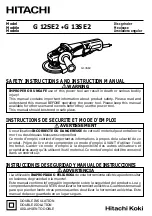
7
ENGLISH
(Original instructions)
u
Support panels or any oversized workpiece to mini-
mize the risk of wheel pinching and kickback.
Large
workpieces tend to sag under their own weight. Supports
must be placed under the workpiece near the line of cut
and near the edge of the workpiece on both sides of the
wheel.
u
Use extra caution when making a "pocket cut" into ex-
isting walls or other blind areas.
The protruding wheel
may cut gas or water pipes, electrical wiring or objects that
can cause kickback.
Safety warnings specific for sanding operations
u
Do not use excessively oversized sanding disc paper.
Follow manufacturers recommendations, when select-
ing sanding paper.
Larger sanding paper extending
beyond the sanding pad presents a laceration hazard and
may cause snagging, tearing of the disc or kickback.
Safety warnings specific for polishing operations
u
Do not allow any loose portion of the polishing bonnet
or its attachment strings to spin freely. Tuck away or
trim any loose attachment strings.
Loose and spinning
attachment strings can entangle your fingers or snag on
the workpiece.
Safety warnings specific for wire brushing opera
-
tions
u
Be aware that wire bristles are thrown by the brush
even during ordinary operation. Do not overstress the
wires by applying excessive load to the brush.
The
wire bristles can easily penetrate light clothing and/or skin.
u
If the use of a guard is recommended for wire brush-
ing, do not allow any interference of the wire wheel or
brush with the guard.
Wire wheel or brush may expand
in diameter due to work load and centrifugal forces.
Safety of others
u
This appliance is not intended for use by persons (includ-
ing children) with reduced physical, sensory or mental
capabilities, or lack of experience and knowledge, unless
they have been given supervision or instruction concern-
ing use of the appliance by a person responsible for their
safety.
u
Children should be supervised to ensure that they do not
play with the appliance.
Residual risks.
Additional residual risks may arise when using the tool which
may not be included in the enclosed safety warnings. These
risks can arise from misuse, prolonged use etc.
Even with the application of the relevant safety regulations
and the implementation of safety devices, certain residual
risks can not be avoided. These include:
u
Injuries caused by touching any rotating/moving parts.
u
Injuries caused when changing any parts, blades or ac-
cessories.
u
Injuries caused by prolonged use of a tool. When using
any tool for prolonged periods ensure you take regular
breaks.
u
Impairment of hearing.
u
Health hazards caused by breathing dust developed when
using your tool (example:- working with wood, especially
oak, beech and MDF.)
Vibration
The declared vibration emission values stated in the technical
data and the declaration of conformity have been measured
in accordance with a standard test method provided by
EN 60745 and may be used for comparing one tool with
another. The declared vibration emission value may also be
used in a preliminary assessment of exposure.
Warning!
The vibration emission value during actual use of
the power tool can differ from the declared value depending
on the ways in which the tool is used. The vibration level may
increase above the level stated.
When assessing vibration exposure to determine safety
measures required by 2002/44/EC to protect persons regularly
using power tools in employment, an estimation of vibration
exposure should consider, the actual conditions of use and the
way the tool is used, including taking account of all parts of the
operating cycle such as the times when the tool is switched off
and when it is running idle in addition to the trigger time.
Labels on tool
The following pictograms are shown on the tool:
:
Warning!
To reduce the risk of injury, the user must
read the instruction manual.
O
Wear safety glasses or goggles when operating this
tool.
N
Wear ear protection when operating this tool.
Electrical safety
#
This tool is double insulated; therefore no earth wire
is required. Always check that the power supply
corresponds to the voltage on the rating plate.
u
If the supply cord is damaged, it must be replaced by the
manufacturer or an authorised Stanley Fat Max Service
Centre in order to avoid a hazard.
Summary of Contents for FATMAX KFFMEG841
Page 1: ...www stanley eu KFFMEG841...
Page 2: ...2 B A D C...
Page 3: ...3 E...
Page 54: ...54 KFFMEG841 Stanley Fat Max 1 a b c 2 a b c d e f 3 a b...
Page 55: ...55 c d e f g 4 a b c d e f g 5 a u...
Page 56: ...56 u u u u u u u u u u u u u u u u...
Page 57: ...57 u u u u u u u u u u u...
Page 58: ...58 u u u u u u u u u u u u u u u u EN 60745...
Page 69: ...69...
Page 70: ...70...
Page 71: ...71...








































